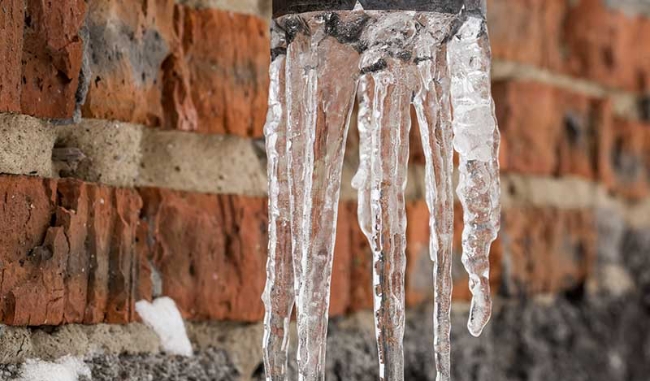How to Protect Your Plumbing from Freezing: Essential Tips
How to Protect Your Plumbing from Freezing: Essential Tips
Blog Article
Each person maintains their unique opinion involving How To Avoid Freezing Pipes.

Cold weather can damage your plumbing, especially by freezing pipes. Here's exactly how to stop it from occurring and what to do if it does.
Introduction
As temperatures drop, the danger of frozen pipelines rises, possibly bring about pricey repairs and water damage. Comprehending how to avoid icy pipes is essential for homeowners in chilly climates.
Recognizing Frozen Pipelines
What causes pipes to ice up?
Pipes ice up when exposed to temperature levels listed below 32 ° F (0 ° C) for prolonged durations. As water inside the pipelines freezes, it broadens, taxing the pipe walls and possibly creating them to burst.
Dangers and problems
Icy pipelines can lead to water system disturbances, home damages, and pricey fixings. Ruptured pipelines can flooding homes and create extensive architectural damages.
Indicators of Frozen Piping
Identifying frozen pipes early can prevent them from bursting.
How to recognize icy pipelines
Try to find reduced water flow from faucets, uncommon smells or sounds from pipes, and noticeable frost on exposed pipelines.
Avoidance Tips
Protecting susceptible pipelines
Wrap pipelines in insulation sleeves or use warmth tape to protect them from freezing temperature levels. Concentrate on pipelines in unheated or outside areas of the home.
Heating techniques
Maintain indoor areas appropriately heated up, specifically areas with plumbing. Open up cupboard doors to allow cozy air to circulate around pipelines under sinks.
Safeguarding Exterior Plumbing
Yard tubes and outdoor taps
Disconnect and drain yard tubes prior to winter. Mount frost-proof faucets or cover exterior taps with protected caps.
What to Do If Your Pipes Freeze
Immediate activities to take
If you think icy pipes, keep faucets open to alleviate pressure as the ice thaws. Utilize a hairdryer or towels soaked in hot water to thaw pipes gradually.
Long-Term Solutions
Architectural changes
Take into consideration rerouting pipelines far from outside wall surfaces or unheated locations. Include additional insulation to attics, basements, and crawl spaces.
Upgrading insulation
Invest in premium insulation for pipes, attics, and wall surfaces. Correct insulation assists preserve consistent temperatures and lowers the threat of frozen pipes.
Verdict
Stopping icy pipes needs proactive procedures and fast actions. By comprehending the causes, indications, and preventive measures, homeowners can protect their pipes during winter.
Helpful Tips to Prevent Frozen Pipes this Winter
UNDERSTANDING THE BASICS: WHY PIPES FREEZE AND WHY IT’S A PROBLEM
Water freezing inside pipes is common during the winter months, but understanding why pipes freeze, and the potential problems it can cause is crucial in preventing such incidents. This section will delve into the basics of why pipes freeze and the associated problems that may arise.
THE SCIENCE BEHIND FROZEN PIPES
When water reaches freezing temperatures, it undergoes a physical transformation and solidifies into ice. This expansion of water as it freezes is the primary reason pipes can burst. As the water inside the pipe freezes, it expands, creating immense pressure on the walls. If the pressure becomes too great, the pipe can crack or rupture, leading to leaks and water damage.
FACTORS THAT CONTRIBUTE TO PIPE FREEZING
Low Temperatures: Extremely cold weather, especially below freezing, increases the risk of pipes freezing. Uninsulated or Poorly Insulated Pipes: Pipes located in unheated areas, such as basements, crawl spaces, or attics, are more prone to freezing. Insufficient insulation or lack of insulation altogether exacerbates the problem. Exterior Wall Exposure: Pipes running along exterior walls are susceptible to freezing as they encounter colder temperatures outside. Lack of Heating or Temperature Regulation: Inadequate heating or inconsistent temperature control in your home can contribute to frozen pipes. PROBLEMS CAUSED BY FROZEN PIPES
- Pipe Bursting: As mentioned earlier, the expansion of water as it freezes can cause pipes to burst, resulting in significant water damage.
- Water Damage: When pipes burst, it can lead to flooding and water damage to your property, including walls, ceilings, flooring, and personal belongings.
- Structural Damage: Prolonged exposure to water from burst pipes can compromise the structural integrity of your home, leading to costly repairs.
- Mold and Mildew Growth: Excess moisture from water damage can create a favorable environment for mold and mildew growth, posing health risks to occupants.
- Disrupted Water Supply: Frozen pipes can also result in a complete or partial loss of water supply until the issue is resolved.
WHY CERTAIN PIPES ARE MORE PRONE TO FREEZING
- Location: Pipes located in unheated or poorly insulated areas, such as basements, crawl spaces, attics, or exterior walls, are at higher risk of freezing.
- Exterior Pipes: Outdoor pipes, such as those used for irrigation or exposed plumbing, are particularly vulnerable to freezing as they are directly exposed to the elements.
- Supply Lines: Pipes that carry water from the main water supply into your home, including the main water line, are critical to protect as freezing in these lines can affect your entire plumbing system.
- Underground Pipes: Pipes buried underground, such as those connected to sprinkler systems or outdoor faucets, can be susceptible to freezing if not properly insulated.
https://busybusy.com/blog/helpful-tips-to-prevent-frozen-pipes-this-winter/

I came across that piece about How to Prevent Your Pipes From Freezing while surfing around the web. Do you know another person who is fascinated by the subject? Why not promote it. Thanks a lot for going through it.
This Website Report this page